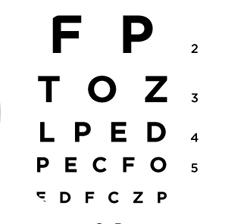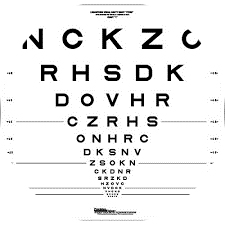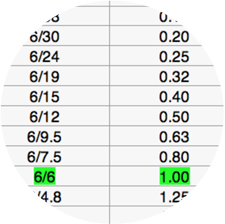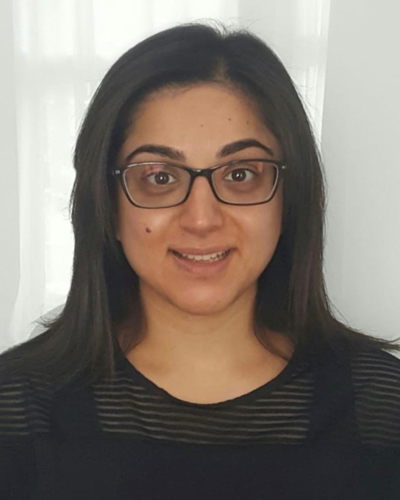

 The practice of Hadi Zambarakji
The practice of Hadi Zambarakji

Newsletter November 2018
Issue 6.1
Modern Cataract Surgery
Mr Hadi Zambarakji, Consultant Vitreoretinal & Cataract surgeon at the Spire London East Hospital and The Holly private hospital looks at the patient’s journey and decision-making process involved in today’s modern cataract surgery.
Cataract surgery is more and more about a precise refractive outcome and Optometrists skills are becoming increasingly important in the patient’s journey. This article aims to provide the Optometrist and the General Practitioner with useful information about the diagnostic process, the operative routine and the after-care received. They will be able to share this information with their patients to ensure the best care possible.
Measuring visual acuity
An important metric by which the outcome of surgery can be measured is Visual Acuity. Normally Snellen acuity is fine, but Doctors may use LogMAR especially with retinal patients.
Be familiar with both notations, but a comparison chart may be useful.

This is the most common scale for re-cording vision, usually at 6 metres

LogMAR is used more and more, especially in retinal clinics

Snellen Notations are normally used, but for more precise recording, LogMAR is preferred
Always record the visual acuity with the patient’s distance glasses on. Record one eye at a time and if the spectacles are not available, use a pinhole.
Finally don’t forget the near vision, and some assessment of “real world vision” or contrast sensitivity can be useful. During the discussion, it is worth finding out from the patient if they are looking for freedom from all spectacles.
Lifestyle Questionnaire
- Which activities are important in your life?
- How important is it for you to have a full range of vision following surgery?
- Following surgery, if you needed to wear glasses occasionally, for which activities would that be acceptable?
- Following surgery would you spend more than an hour a day readying a book at a close distance<45cm?
- If you had good vision during the day would it bother you if you experienced rings, halos or glare at night?
- How important is it for you to discern subtle differences in colour?
- How important is it for you to see well in low light conditions?
- How would your friends describe you?
Easy Going ———————— Perfectionist
Referral
To refer a patient it is useful to include the following information:
An Optometric up-to-date refraction with the near addition for reading visual acuity and what is the patient’s expectation from surgery.
The General Practitioner can supply general health and allergy information.
Referrals from colleague Ophthalmologists are usually for patients who may be at a higher risk of a vitreoretinal complication, unstable zonules, previous ocular trauma or lens injuries from previous intravitreal injections.
The patient journey
On speaking to Molly who runs the Retinacare office, practical issues around the clinic appointment date, date of surgery and post op review dates are organized in advance. Payment methods are also discussed and for patients who have health insurance, we have a cataract package arrangement with both Bupa and AXA PPP. The Pre-operative assessment is done at the time of the first clinic visit as well as all the necessary measurements for the lens implant to avoid unnecessary clinic appointments.
In the clinic the patient will be seen initially by Raj who is an experienced Optometrist with an interest in managing pre and post op cataract patients. Raj will carry out the necessary diagnostic tests, check the visual acuity and go through with the patient our standard cataract life-style questionnaire. This will give us an idea about the patient’s expectations and his or her needs.
Younger patients need an even more detailed assessment, as they are generally quite active and generally do not like to be reliant on distance or reading spectacles.


Audit data (2017)
Monofocal lens implant surgery
89% within 0.5 D of refractive aim
93.3% within 1 D of refractive aim
After excluding eyes with macular pathology and glaucoma
Unaided visual acuity 6/12 or better (0.3 Log Mar) 83%
Best corrected visual acuity 6/12 or better (0.3 Log Mar) 100%
Unaided visual acuity 6/9 or better (0.2 Log Mar) 74%
Best corrected visual acuity 6/9 or better (0.2 Log Mar) 94%
Multifocal lens implant surgery with Oculentis MF20
Unaided reading visual acuity N8 or better 91%
Unaided visual acuity 6/12 or better (0.3 Log Mar) 100%
Unaided visual acuity 6/9 or better (0.2 Log Mar) 72%
Best corrected visual acuity 6/9 or better (0.2 Log Mar) 91%
No comments yet
Leave a comment
Search the RetinaCare website
Newsletter Archive
![]() Retinacare Newsletter Issue 7.1 (January 2021)
Retinacare Newsletter Issue 7.1 (January 2021)
![]() Retinacare Newsletter Issue 6.2 (December 2018)
Retinacare Newsletter Issue 6.2 (December 2018)
![]() Retinacare Newsletter Issue 6.1 (November 2018)
Retinacare Newsletter Issue 6.1 (November 2018)
![]() Retinacare Newsletter Issue 5.1 (Spring 2016)
Retinacare Newsletter Issue 5.1 (Spring 2016)
![]() Retinacare Newsletter Issue 4.1 (Spring 2015)
Retinacare Newsletter Issue 4.1 (Spring 2015)
![]() Retinacare Newsletter Issue 3.1 (Summer 2014)
Retinacare Newsletter Issue 3.1 (Summer 2014)
![]() Retinacare Newsletter Issue 2.1 (Summer 2013)
Retinacare Newsletter Issue 2.1 (Summer 2013)
![]() Retinacare Newsletter Issue 1.3 (Winter 2012)
Retinacare Newsletter Issue 1.3 (Winter 2012)
![]() Retinacare Newsletter Issue 1.2 (Autumn 2012)
Retinacare Newsletter Issue 1.2 (Autumn 2012)
![]() Retinacare Newsletter Issue 1.1 (Summer 2012)
Retinacare Newsletter Issue 1.1 (Summer 2012)
If you are subscribed and don’t wish to receive any further newsletters, please email: info@retinacare.org.uk
News & GP Articles
 Management of advanced diabetic eye disease:
Management of advanced diabetic eye disease:
Diabetic Eye Journal; March 2014
 Delivering drugs to the retina:
Delivering drugs to the retina:
Newsletter for GPs Holly House Hospital; Winter 2014 (page 8)
 Diabetic macular oedema:
Diabetic macular oedema:
Practice matters issue 14; December 2013
 Guide to Vitrectomy for Floaters
Guide to Vitrectomy for Floaters
 Guide to 23 gauge vitrectomy surgery
Guide to 23 gauge vitrectomy surgery
Useful links
Certificate of Vision Impairment (CVI) Registration:
The Royal College of Ophthalmologists:
This should probably the first site accessed by anyone in the UK who would like to obtain information about eye care. The College provides valuable support for professionals and patients.
The National Institute for Health and Care Excellence (NICE):
NICE Supports healthcare professionals and others to make sure that the care they provide is of the best possible quality. NICE provide independent, authoritative and evidence-based guidance on the most effective ways to prevent, diagnose and treat disease and ill health, reducing inequalities and variation.
BEAVRS:
BEAVRS is the acronym for the British and Eire Association of Vitreoretinal Surgeons. The aim of the Association is to promote high quality patient care by supporting and representing British and Irish Vitreo-Retinal Surgeons through education, research, audit and revalidation.
Euretina:
This should probably the first site accessed by anyone in the UK who would like to obtain information about eye care. The College provides valuable support for professionals and patients.
The Macular Society:
This society has been supporting people with macular conditions, including age-related macular degeneration (AMD), for 25 years. The society offers information and support while funding research to find a cure. All services are free so that no one has to face a macular condition alone. This is the best site in the UK if you are a patient with macular degeneration and would like to know more and seek where can you get support.
Royal National Institute of Blind People (RNIB):
The RNIB is the leading charity offering information, support and advice to almost two million people with sight loss. The RNIB provide practical ways to help patients live with sight loss, and give advice to help travel, shop and manage money and finances independently. The RNIB also give advice on technology for blind and partially sighted people.
The British Medical Association (BMA):
The BMA stand up for doctors both individually and collectively on a wide variety of employment issues and, since the inception of the NHS, have been formally recognised for collective bargaining purposes within national negotiating machinery and by individual employers at local level.
The “access to work program”:
This government program helps pay for practical support so anyone with a disability can do their job (in the case of my patient, this is usually a visual disability). This is free of charge to anyone in the UK.
www.gov.uk/access-to-work/overview
The implantable intraocular telescope for patients with advanced age-related macular degeneration:
The CentraSight treatment programme uses a tiny telescope, which is implanted inside the eye to improve vision and quality of life for individuals affected by end-stage age-related macular degeneration. The above link allows the patient to find the necessary information about this program. Mr. Hadi Zambarakji is currently in the process of developing a patient pathway and will be offering with CentraSight this new technology to his patients.